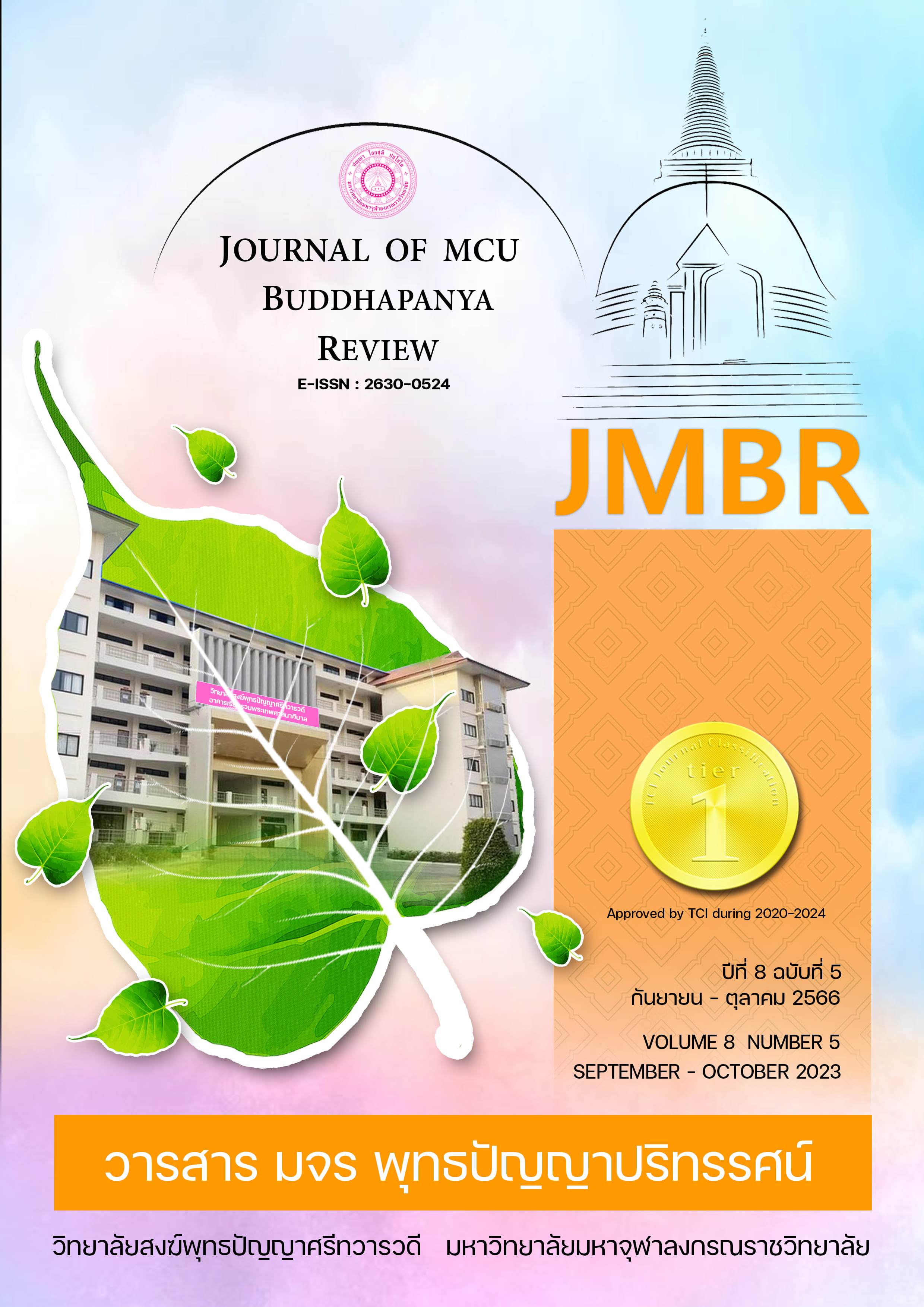GUIDELINES FOR THE PROMOTION OF HONESTY FOR YOUTH IN RANONG PROVINCE
Keywords:
Promotion, Honesty, YouthAbstract
The research on Guidelines for the Promotion of Honesty for Youth in Ranong Province is aimed to 1) study the current situation regarding honesty in the Thai context, and 2) provide guidelines for the promotion of honesty for youth in Ranong province. This is a type of qualitative research in which the researcher reviewed the related documents, conducted in-depth interviews, made observations, and organized a focus group discussion. The obtained data were analyzed using content analysis, categorized into groups for interpretation and presentation, and verified by triangulation method. The results indicated that: 1) honesty is a basic righteousness among good Samaritans, involving holding on to what is right, behaving truthfully towards oneself and others, avoiding fraudulence, maintaining transparency in work, and being verifiable, and 2) guidelines for promoting honesty use the FRA model, which includes: (1) family, (2) appreciation of religion, and (3) attitude towards honesty.
References
Bhat, Adi. (2023). In-depth Interviews: Definition and how to conduct them. Retrieved from: https://www.questionpro.com/blog/in-depth-interviews/ on April 22, 2023.
Bryant, Colleen Doyle. (2022). What is honesty for kids? Retrieved from: https://talkingtreebooks.com/teaching-resources-catalog/
Busetto, Loraine, Wick, Wolfgang, and Gumbinger, Christoph. (2020). How to use and assess qualitative research methods. Neurological Research and Practice, Volume 2, Issue 14, pp. 1-10.
Delve, Ho, L., and Limpaecher, A. (2023). What Is Researcher Triangulation in Qualitative Analysis? Retrieved from: https://delvetool.com/blog/researcher-triangulation on April 21, 2023.
George, Tegan. (2023). What Is Qualitative Observation? Retrieved from: https://www..scribbr.com/methodology/qualitative-observation/ on April 20, 2023
Khon Phuthorn. (2010). Honesty, the needed virtue. Retrieved from: http://pws.npru.ac.th on April 10, 2023.
Kittipong Boonrong. (2007). The Study of Process of Service Management of the Administrator and the Development of Desirable Characteristics of Learners about Honesty: A Case Study of Baan Tak Dad School, Phang Nga Educational Service Area Office. Thesis for the Master Degree of Education, Phuket Rajabhat University.
Ma, Fengling, Heyman, Gail, Jing, Chunyan, and Lee, Kang. (2017). Promoting honesty in young children through observational learning. Journal of Experimental Child Psychology, Volume 167, pp. 234-245.
Malloy, Lindsay c., Mugno, Allison P., Waschbusch, Daniel A., Pelham, William E, Jr. and Talwar, Victoria. (2019) Parents’ Attitudes about and Socialization of Honesty and Dishonesty in Typically-Developing Children and Children with Disruptive Behavior Disorders. Journal of Abnormal Child Psychology, Volume 47, Number 2, pp. 299-312.
Montree Wongsaphan, Phamornpun Yurayat, Ratchaneewan Tangpakdee, Surachet Noirid, and Tatsirin Sawangboon. (2020). Research and Development of Mechanisms on Honesty Enhancing in Basic Education Level Schools. Journal of Education, Mahasarakham University, Volume 14, Number 2, April-June, pp. 247-267.
Panya Chayajindawong and Trilada Thamadisai. (2007). Ethics and Thai Official. Executive Journal, Volume 27, Issue 3, July-September, pp. 32-35.
Phramaha Hansa Dhammahaso. (2018). Honest as a Preventive Mechanism for Corruption in Thai Contemporary Society. Retrieved from: https://www.mcu.ac.th/article/detail/439 on April 20, 2023.
Predictive. (2021). Focus Group and In-depth Interview, how to use them? Retrieved from: https://predictive.co.th/enblog/focus-group-vs-in-depth-interview/ on April 20, 2023.
Rachen Phiphatanakul. (2019). Ethics and Management. Journal of Philosophical Vision, Volume 24, Number 2, July-December, pp. 44-54.
Sherwood, Harriet. (2015). Religious children are meaner than their secular counterparts, study finds. Retrieved from: https://www.theguardian.com/world/2015/nov/06/
Siriyakorn Pongpai. (2023). Self-Discipline. Retrieved from: https://siters.google.com/sarby-hnathi-phlmeuxng-m-1 on April 1, 2023.
Somruean Sitthiya and Prawit Erawan. (2017). Development of Honesty Indicators for Elementary School Students. Journal of Education, Mahasarakham University, Volume 11, Number 3, July-September, pp. 152-160.
Sutasinee Sirikit, Phra Widesbrommakun, and Somchai Srinok. (2022). Development of Morality about Honesty of Students at Wiang Sa-at Phithayakom, Wiang Sa-at Sub-district, Phayakkhaphuphisai District, Mahasarakham Province. Journal of MCU Humanities Review, Volume 8, Number 1, January-June, pp. 141-154.
Talwar, Victoria. (2022). The Truth About Lying: Teaching Honesty to Children at Every Age and Stage. Washington, D.C.: APA Life Tools.
Tong, Donia and Talwar, Victoria. (2021). Understanding the development of honesty in children through the domains-of-socialization approach. Infant and Child Development Journal, Volume 30, Number 3, pp. 1-4.
Umi Chotimah, Kurnisar and Ermanovida, Norma Juainah. (2021). Building religious, honesty, discipline, and student curiosity character through HOT-based online civic education learning. Journal Civics: Media Kaijan Kewarganegaraan, Volume 18, Number 1, April, pp. 118-1216.
Utomo, N. Nurhaliza Suhada. (2021). The Role of Family in Instilling a Child’s Honesty. In the proceedings of the ICEHoS—International Conference on Education, Humanities, and Social Science, March 27, Indonesia.
Yuvadee Phongrod. (2018). The Driving Forward of Good Governance towards the New Public Management: The Case Study of Pibulsongkram Rajabhat University Lecturers. Humanities and Social Science Journal of Graduate School, Pibulsongkram Rajabhat University, Volume 12, Number 2, July-December, pp. 334-351.
Downloads
Published
How to Cite
Issue
Section
License
Copyright (c) 2023 Journal of MCU Buddhapanya Review

This work is licensed under a Creative Commons Attribution-NonCommercial-NoDerivatives 4.0 International License.



